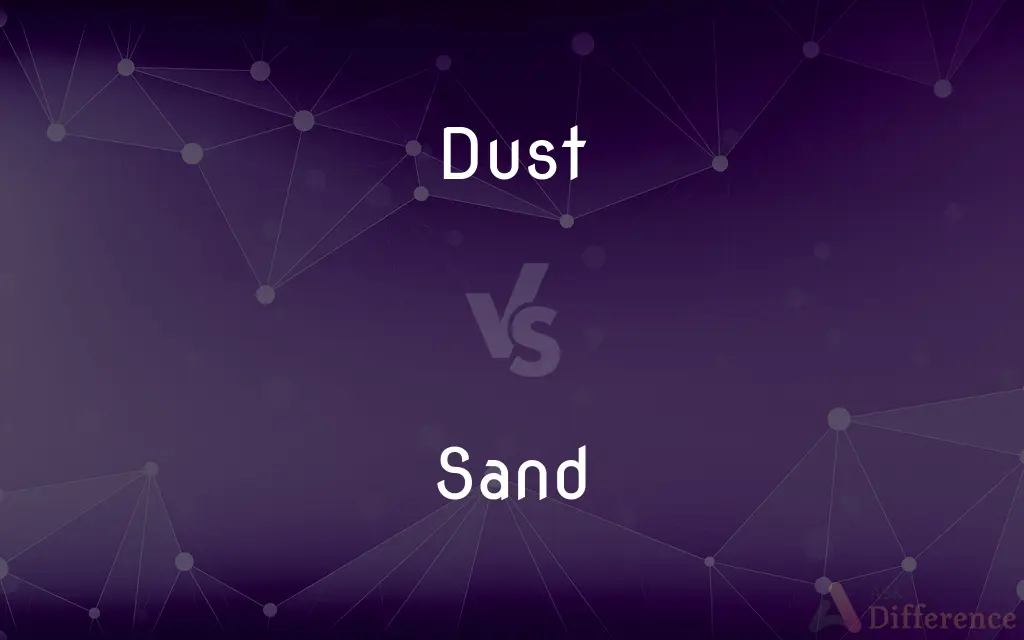Dust vs. Sand — What's the Difference?
By Maham Liaqat & Urooj Arif — Updated on May 7, 2024
Dust consists of fine, dry particles that can float in the air, while sand is composed of larger, granular particles that typically settle on surfaces and accumulate in larger quantities.

Difference Between Dust and Sand
Table of Contents
ADVERTISEMENT
Key Differences
Dust comprises tiny, lightweight particles from soil, dead skin cells, or pollutants that often remain airborne. Sand, in contrast, consists of coarse particles, primarily mineral grains like quartz, and settles more quickly due to its weight.
Dust commonly accumulates indoors on surfaces due to its ability to float in air currents. Sand, on the other hand, is often found outdoors on beaches, deserts, and riverbeds, though it can be tracked indoors.
Dust poses health risks when inhaled over time, as it can irritate the respiratory system. Sand, in comparison, isn't typically harmful unless inhaled or swallowed in large amounts.
Dust forms as a result of human activities, animal debris, and natural erosion, while sand is naturally produced through the weathering of rocks and mineral deposits.
Dust particles are too small for practical construction use, while sand is essential in construction, especially in concrete and glass-making.
ADVERTISEMENT
Comparison Chart
Particle Size
Very fine, can remain airborne
Coarse, granular, settles quickly
Composition
Soil, skin cells, pollutants, debris
Mineral grains, primarily quartz
Health Impact
Respiratory irritation from inhalation
Minor, unless inhaled or swallowed
Common Locations
Indoors on surfaces, in the atmosphere
Beaches, deserts, riverbeds
Usage
Limited usage in research
Construction, glass-making, landscaping
Compare with Definitions
Dust
Fine, dry particles floating in the air or settling on surfaces.
The bookshelf was covered in a thick layer of dust.
Sand
Mineral grains produced by weathering and erosion.
Sand grains often contain quartz and feldspar minerals.
Dust
Particles originating from soil, pollution, and debris.
Industrial activity contributes to the dust in the atmosphere.
Sand
An aggregate used in construction, especially for concrete and glass.
The workers mixed cement, sand, and gravel to make concrete.
Dust
Something regarded as worthless or insignificant.
His dreams were reduced to dust after the rejection letter.
Sand
Coarse, granular material found on beaches and deserts.
She brushed the sand off her feet after walking along the shore.
Dust
Tiny particles in space that form cosmic dust clouds.
Scientists studied the dust particles captured from the comet’s tail.
Sand
A metaphor for endurance and resilience.
He showed a lot of sand by persevering through those challenges.
Dust
Accumulated debris from dead skin cells, fabric fibers, and pollutants.
Household dust can worsen allergies and asthma.
Sand
Loose, granular material used in children’s play areas.
The children happily dug and played in the sandpit.
Dust
Dust is made of fine particles of solid matter. On Earth, it generally consists of particles in the atmosphere that come from various sources such as soil lifted by wind (an aeolian process), volcanic eruptions, and pollution.
Sand
Sand is a granular material composed of finely divided rock and mineral particles. Sand has various compositions but is defined by its grain size.
Dust
Fine, dry particles of matter.
Sand
Small loose grains of worn or disintegrated rock.
Dust
A cloud of fine, dry particles.
Sand
(Geology) A sedimentary material, finer than a granule and coarser than silt, with grains between 0.06 and 2.0 millimeters in diameter.
Dust
Particles of matter regarded as the result of disintegration
Fabric that had fallen to dust over the centuries.
Sand
Often sands A tract of land covered with sand, as a beach or desert.
Dust
Earth, especially when regarded as the substance of the grave
"ashes to ashes, dust to dust" (Book of Common Prayer).
Sand
The loose, granular, gritty particles in an hourglass.
Dust
The surface of the ground.
Sand
Sands Moments of allotted time or duration
"The sands are numb'red that makes up my life" (Shakespeare).
Dust
A debased or despised condition.
Sand
(Slang) Courage; stamina; perseverance
"She had more sand in her than any girl I ever see.
In my opinion she was just full of sand" (Mark Twain).
Dust
Something of no worth.
Sand
A light grayish brown to yellowish gray.
Dust
Chiefly British Rubbish readied for disposal.
Sand
To sprinkle or cover with or as if with sand.
Dust
Confusion; agitation; commotion
Won't go back in until the dust settles.
Sand
To polish or scrape with sand or sandpaper.
Dust
To remove dust from by wiping, brushing, or beating
Dust the furniture.
Sand
To mix with sand.
Dust
To sprinkle with a powdery substance
Dusted the cookies with sugar.
Dust crops with fertilizer.
Sand
To fill up (a harbor) with sand.
Dust
To apply or strew in fine particles
Dusted talcum powder on my feet.
Sand
(uncountable) Rock that is ground more finely than gravel, but is not as fine as silt (more formally, see grain sizes chart), forming beaches and deserts and also used in construction.
Dust
(Baseball) To deliver a pitch so close to (the batter) as to make the batter back away.
Sand
A beach or other expanse of sand.
The Canadian tar sands are a promising source of oil.
Dust
To clean by removing dust.
Sand
Personal courage.
Dust
To cover itself with dry soil or other particulate matter. Used of a bird.
Sand
A particle from 62.5 microns to 2 mm in diameter, following the Wentworth scale.
Dust
Fine particles
Sand
A light beige colour, like that of typical sand.
Dust
(uncountable) Fine, dry particles of matter found in the air and covering the surface of objects, typically consisting of soil lifted up by the wind, pollen, hair, etc.
Sand
A single grain of sand.
Dust
Submicron particles in outer space, largely silicates and carbon compounds, that contribute greatly to extinction at visible wavelengths.
Sand
A moment or interval of time; the term or extent of one's life (referring to the sand in an hourglass).
Dust
(obsolete) A single particle of earth or other material.
Sand
(colloquial) A sandpiper.
Dust
(countable) The act of cleaning by dusting.
Sand
Of a light beige colour, like that of typical sand.
Dust
The earth, as the resting place of the dead.
Sand
(transitive) To abrade the surface of (something) with sand or sandpaper in order to smooth or clean it.
Dust
The earthy remains of bodies once alive; the remains of the human body.
Sand
(transitive) To cover with sand.
Dust
(figurative) Something worthless.
Sand
To blot ink using sand.
Dust
(figurative) A low or mean condition.
Sand
Fine particles of stone, esp. of siliceous stone, but not reduced to dust; comminuted stone in the form of loose grains, which are not coherent when wet.
That finer matter, called sand, is no other than very small pebbles.
Dust
Cash; money (in reference to gold dust).
Sand
A single particle of such stone.
Dust
(colloquial) A disturbance or uproar.
To raise, or kick up, a dust
Sand
The sand in the hourglass; hence, a moment or interval of time; the term or extent of one's life.
The sands are numbered that make up my life.
Dust
(mathematics) A totally disconnected set of points with a fractal structure.
Sand
Tracts of land consisting of sand, like the deserts of Arabia and Africa; also, extensive tracts of sand exposed by the ebb of the tide.
Dust
(transitive) To remove dust from.
The cleaning lady needs a stool to dust the cupboard.
Sand
Courage; pluck; grit.
Dust
(intransitive) To remove dust; to clean by removing dust.
Dusting always makes me cough.
Sand
To sprinkle or cover with sand.
Dust
(intransitive) Of a bird, to cover itself in sand or dry, dusty earth.
Sand
To drive upon the sand.
Dust
(transitive) To spray or cover something with fine powder or liquid.
The mother dusted her baby's bum with talcum powder.
Sand
To bury (oysters) beneath drifting sand or mud.
Dust
To leave; to rush off.
Sand
To mix with sand for purposes of fraud; as, to sand sugar.
Dust
To reduce to a fine powder; to levigate.
Sand
A loose material consisting of grains of rock or coral
Dust
(slang) To kill.
Sand
French writer known for works concerning women's rights and independence (1804-1876)
Dust
Fine, dry particles of earth or other matter, so comminuted that they may be raised and wafted by the wind; that which is crumbled to minute portions; fine powder; as, clouds of dust; bone dust.
Dust thou art, and unto dust shalt thou return.
Stop! - for thy tread is on an empire's dust.
Sand
Fortitude and determination;
He didn't have the guts to try it
Dust
A single particle of earth or other matter.
Sand
Rub with sandpaper;
Sandpaper the wooden surface
Dust
The earth, as the resting place of the dead.
For now shall sleep in the dust.
Dust
The earthy remains of bodies once alive; the remains of the human body.
And you may carve a shrine about my dust.
Dust
Figuratively, a worthless thing.
And by the merit of vile gold, dross, dust.
Dust
Figuratively, a low or mean condition.
[God] raiseth up the poor out of the dust.
Dust
Gold dust
Dust
To free from dust; to brush, wipe, or sweep away dust from; as, to dust a table or a floor.
Dust
To sprinkle with dust.
Dust
To reduce to a fine powder; to levigate.
Dust
Fine powdery material such as dry earth or pollen that can be blown about in the air;
The furniture was covered with dust
Dust
The remains of something that has been destroyed or broken up
Dust
Free microscopic particles of solid material;
Astronomers say that the empty space between planets actually contains measurable amounts of dust
Dust
Remove the dust from;
Dust the cabinets
Dust
Rub the dust over a surface so as to blur the outlines of a shape;
The artist dusted the charcoal drawing down to a faint image
Dust
Cover with a light dusting of a substance;
Dust the bread with flour
Dust
Distribute loosely;
He scattered gun powder under the wagon
Common Curiosities
Is dust the same as sand?
No, dust is finer and remains airborne, whereas sand is coarser and settles quickly.
Is sand only found in deserts?
No, sand is also found on beaches, riverbeds, and artificial play areas.
Does dust come from pollution?
Some dust particles originate from pollution, while others come from natural sources like soil.
Is dust harmful to health?
Yes, especially for people with respiratory conditions, dust can irritate or trigger symptoms.
Does sand contain dust particles?
Sand can contain some dust due to erosion or handling but consists mainly of mineral grains.
Can I use dust in construction like sand?
No, dust particles are too fine, unlike sand which is structurally essential.
Can sand be recycled?
Sand can be reused in some construction applications, like backfilling.
Can dust impact electronics?
Yes, dust accumulation can affect cooling systems and performance in electronic devices.
Is sand uniform in color and composition?
No, sand varies in color and composition based on local minerals and environment.
Is sand renewable or non-renewable?
Sand is non-renewable as its formation takes thousands of years.
Does sand have any nutritional value?
No, sand isn't nutritious and should not be ingested.
How does dust affect air quality?
Dust particles can degrade air quality and lead to respiratory issues.
How does dust accumulate indoors?
Dust gathers from shedding skin, dirt, and pollutants settling on surfaces.
Is dust always visible to the naked eye?
No, some dust particles are microscopic and invisible without magnification.
Can dust contribute to climate change?
Some airborne dust can influence climate by reflecting sunlight or affecting cloud formation.
Share Your Discovery

Previous Comparison
Hope vs. Aspiration
Next Comparison
Fortepiano vs. PianoforteAuthor Spotlight
Written by
Maham LiaqatCo-written by
Urooj ArifUrooj is a skilled content writer at Ask Difference, known for her exceptional ability to simplify complex topics into engaging and informative content. With a passion for research and a flair for clear, concise writing, she consistently delivers articles that resonate with our diverse audience.













































